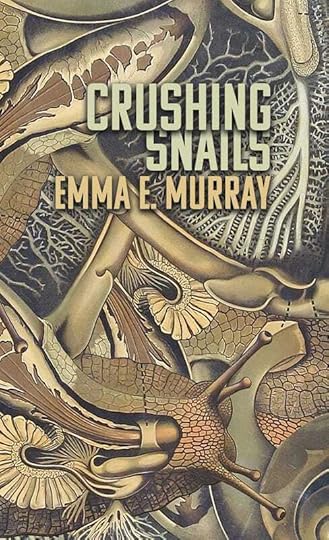Why You Should Read the Book I DNF'd

I was super excited to read Emma E. Murray’s Crushing Snails (Apocalypse Party, out today). I love Murray’s work—When the Devil (Shortwave) was one of my favorite reads this spring.
I DNF’d Crushing Snails at 11%.
This is not a black mark against the book. Five big gold stars.
Crushing Snails is a novel about “burgeoning serial killer,” sixteen-year-old Winnie Campbell. As the description says, “Her father blames her for her mother's death, dotes on her little sister, and executes increasingly cruel punishments meant to humiliate Winnie. As the punishments morph into torture, she begins fantasizing about regaining some semblance of power …”
I didn’t make it to the serial killer part.
Winnie’s abuse comes from a narcissistic (borderline psychotic) father who scapegoats her. She’s subjected to brutal abuse because her little sister makes up lies; she’s forced to clean until her hands blister because that sister spilled milk, and she was blamed. Her little brother expects her to do his homework. Bullies harass her at school. Winnie’s life? It’s straight awful. She doesn’t see a way out, and she wants to die.
Winnie’s voice was so authentic, so raw, and so real that I couldn’t make it past the first few chapters.
Let me explain.
Narcissistic Abuse Is RealNarcissistic abuse refers to abuse, generally or partially psychological, stemming from a parent with narcissistic tendencies or narcissistic personality disorder. Narcissistic parents see children not as people, but as props to bolster their self-image. Narcissists, according to the Newport Institute, “can be charming and highly functional … [but] suffer from feelings of superiority and entitlement that demand they be the center of attention. They manipulate others, family members included, to get their needs met, and require excessive admiration.” Narcissists exhibit a stunning lack of empathy, refuse to accept blame, and and refuse to hold themselves accountable.
Narcissistic parents use fear and and manipulation to exert their authority over their children, including ridicule, criticism, and isolation. They bully and gaslight, withdrawing love when their children act in ways they find unacceptable—and children of narcissists know that “acceptable,” to a parent, means “only what makes me look good.” Siblings are often pitted against one another, with one cast as the golden child who can do no wrong, and another castigated as the perpetual scapegoat. Narcissistic parents expect excessive praise and admiration for their parenting, though they also compete with their children. Boundaries are nonexistent.
The father in Crushing Snails is clearly a narcissist, and Winnie’s the family scapegoat: subordinated to her brother and sister, blamed for their misbehavior, punished because her father’s in a bad mood. It’s brutal. It’s honest. Crushing Snails is a deeply real novel, one that grapples with the real ugliness of child abuse.
In other words: Winnie’s voice was so authentic that I had to set down the book. As a survivor of narcissistic parents, I couldn’t stand to continue. Her inner monologue sounded too familiar.
Confronting the Horror of Child AbuseAbuse like Winnie’s happens every day—physical abuse, but emotional abuse as well.
While my parents’ abuse was primarily emotional (though hitting did happen), like Winnie, I also was scapegoated. If I spilled a drink, my parents screamed in my face: Why are you so clumsy? What’s wrong with you? Why don’t you have any common sense? You’re so useless. My brother’s tattling would bring down the same raft of invective: It’s no wonder you don’t have any friends. No one likes you because you act this way.
My brother made a mess in our room? My fault. My brother and I were fighting? My fault. My parents were angry? My fault, and if I protested, I was punished for lying. As the neurodivergent child in a neurotypical household, I was labeled “weird,” and regularly told “no one will like you if you do x” and “It’s your fault you don’t have friends.”
Like Winnie, I thought there was no way out.
By the time I turned sixteen, I harbored a deep well of rage that occasionally disturbed teachers; when confronted about it, my ensuing flat affect and naked doubt about their kind motivations (I assumed I was being punished) off-put them even more. I didn’t tilt into a killer. But I understand how it happens.
So does Murray, and Crushing Snails utilizes that understanding to brutal and unforgettable effect. It’s real and raw, heartbreaking and gut-wrenching. The subject matter is true horror, not the supernatural kind. It could happen, and that’s what makes the novel so devastating.
Read the Book I Couldn’t FinishI’d love to delve into more good things about this novel. I can’t, because it shook me so badly I had to set it down. Murray’s known for her stellar command of voice and evocative prose, and Crushing Snails is no exception. It’s a beautiful nightmare, so good I couldn’t finish it. Crushing Snails is so effective at its portrayal of a burgeoning serial killer, and its voice so authentic, that I found it too triggering to continue. I was hearing my own sixteen-year-old inner monologue, long-buried; I couldn’t stand to continue. This novel is real. It’s harrowing.
Pick up your copy now.



